- Clone
- P1F6 (See other available formats)
- Regulatory Status
- RUO
- Other Names
- ITGAV, MSK8, VNRA, VTNR
- Isotype
- Mouse IgG1, κ
- Ave. Rating
- Submit a Review
- Product Citations
- publications
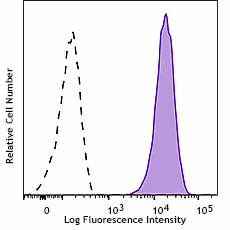
-

Human fibrocarcinoma cell line HT1080 was stained with anti-human/rat CD51 (Integrin αvβ5) (clone P1F6) APC (filled histogram) or mouse IgG1, κ APC isotype control (open histogram).
| Cat # | Size | Price | Quantity Check Availability | Save | ||
|---|---|---|---|---|---|---|
| 920011 | 25 tests | $95 | ||||
| 920012 | 100 tests | $225 | ||||
CD51 is a type I integral membrane glycoprotein, known as vitronectin receptor α chain, or integrin αV. It forms heterodimer with integrin β1 (CD29), β3 (CD61), β5, β6, or β8. CD51 contains two disulfide-linked subunits of 125 kD and 24 kD, and is expressed on endothelial cells, fibroblasts, macrophages, platelets, osteoclasts, neuroblastoma, melanoma, and hepatoma cells. Many extracellular matrix proteins with RGD-motifs are CD51 ligands. In association with its β chains, CD51 binds vitronectin, von Willebrand factor, fibronectin, thrombospondin, osteopontin, fibrinogen, and laminin. CD51, as an adhesion molecule, plays important roles in leukocytes homing and rolling and mediates bone absorption and angiogenesis.
Product DetailsProduct Details
- Verified Reactivity
- Human, Rat
- Reported Reactivity
- Hamster
- Antibody Type
- Monoclonal
- Host Species
- Mouse
- Immunogen
- The P1F6 monoclonal antibody was generated against human small cell lung carcinoma cells (UCLA P3).
- Formulation
- Phosphate-buffered solution, pH 7.2, containing 0.09% sodium azide and BSA (origin USA)
- Preparation
- The antibody was purified by affinity chromatography and conjugated with APC under optimal conditions.
- Concentration
- Lot-specific (to obtain lot-specific concentration and expiration, please enter the lot number in our Certificate of Analysis online tool.)
- Storage & Handling
- The antibody solution should be stored undiluted between 2°C and 8°C, and protected from prolonged exposure to light. Do not freeze.
- Application
-
FC - Quality tested
- Recommended Usage
-
Each lot of this antibody is quality control tested by immunofluorescent staining with flow cytometric analysis. For flow cytometric staining, the suggested use of this reagent is 5 µL per million cells in 100 µL staining volume or 5 µL per 100 µL of whole blood. It is recommended that the reagent be titrated for optimal performance for each application.
- Excitation Laser
-
Red Laser (633 nm)
- Application Notes
-
P1F6, reacts with the avß5 integrin complex. This antibody does not cross react with any other av containing integrin and completely inhibits avß5 dependent binding to vitronectin coated surfaces.
- Product Citations
-
- RRID
-
AB_2894599 (BioLegend Cat. No. 920011)
AB_2894599 (BioLegend Cat. No. 920012)
Antigen Details
- Structure
- Two disulfide-linked subunits of 125 kD and 24 kD.
- Distribution
-
Endothelial cells, fibroblasts, macrophages, platelets, osteoclasts, neuroblastoma, melanoma, and hepatoma cells.
- Function
- As an adhesion molecule, it plays important roles in leukocytes homing and rolling as well as mediates bone absorption and angiogenesis.
- Interaction
- Forms heterodimer with integrin β1 (CD29), β3 (CD61), β5, β6, or β8.
- Cell Type
- Endothelial cells, Fibroblasts, Macrophages, Mesenchymal Stem Cells, Osteoclasts, Platelets
- Biology Area
- Cell Adhesion, Cell Biology, Costimulatory Molecules, Neuroscience, Stem Cells, Synaptic Biology
- Molecular Family
- Adhesion Molecules, CD Molecules
- Antigen References
-
1. Burvenich I, et al. 2008. Mol. Cancer Ther. 7(12):3771.
2. Lee P, et al. 2014. J. Biol. Chem. 289(3):1467.
3. Su G, et al. 2007. Am. J. Respir. Cell Mol. Biol. 36(3):377.
4. Wayner EA, et al. 2007. Methods in Enzymology 426:117.
5. Weinacker A, et al. 1994. J. Biol. Chem. 269(9):6940. - Gene ID
- 3685 View all products for this Gene ID
- UniProt
- View information about CD51 on UniProt.org
Related Pages & Pathways
Pages
Related FAQs
Other Formats
View All CD51 (Integrin αvβ5) Reagents Request Custom Conjugation| Description | Clone | Applications |
|---|---|---|
| Purified anti-human/rat CD51 (Integrin αvβ5) | P1F6 | FC |
| Alexa Fluor® 647 anti-human/rat CD51 (Integrin αvβ5) | P1F6 | FC |
| PE anti-human/rat CD51 (Integrin αvβ5) | P1F6 | FC |
| Alexa Fluor® 488 anti-human/rat CD51 (Integrin αvβ5) | P1F6 | FC |
| PE/Cyanine7 anti-human/rat CD51 (Integrin αvβ5) | P1F6 | FC |
| APC anti-human/rat CD51 (Integrin αvβ5) | P1F6 | FC |
Compare Data Across All Formats
This data display is provided for general comparisons between formats.
Your actual data may vary due to variations in samples, target cells, instruments and their settings, staining conditions, and other factors.
If you need assistance with selecting the best format contact our expert technical support team.
-
Purified anti-human/rat CD51 (Integrin αvβ5)
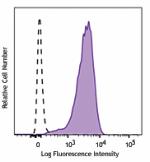
HT1080 cells were stained with purified CD51 (clone P1F6) (c... -
Alexa Fluor® 647 anti-human/rat CD51 (Integrin αvβ5)
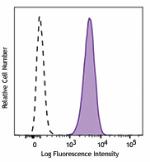
HT1080 cells were stained with purified CD51 (clone P1F6) Al... -
PE anti-human/rat CD51 (Integrin αvβ5)
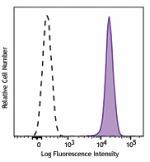
Human fibrocarcinoma cell line HT1080 was stained with CD51 ... -
Alexa Fluor® 488 anti-human/rat CD51 (Integrin αvβ5)
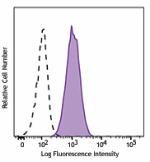
Human fibrocarcinoma cell line HT1080 was stained with CD51 ... -
PE/Cyanine7 anti-human/rat CD51 (Integrin αvβ5)
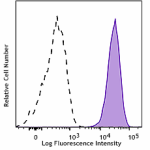
Human fibrocarcinoma cell line HT1080 was stained with anti-... -
APC anti-human/rat CD51 (Integrin αvβ5)
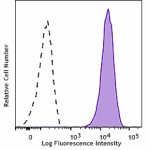
Human fibrocarcinoma cell line HT1080 was stained with anti-...
 Login/Register
Login/Register 













Follow Us